Stuffy noses are no fun.
Nasal congestion can make it difficult to breathe and ruin the way your food tastes. If untreated, it may even lead to sinus infections and other problems.
Dogs can suffer from nasal congestion too. And, just like in humans, it probably makes them feel miserable.
In fact, because your dog learns more about the world through his nose than you do, it is likely that stuffy noses are even more irritating for dogs than they are for people.
Below, we’ll talk about what you need to do when your dog has nasal congestion and discuss the use of nasal decongestants and other medications for dogs.
Key Takeaways: What Can I Give My Dog for Nasal Congestion?
- Just like us, dogs can suffer from nasal problems like a runny nose or congestion. Many mild cases resolve on their own, but lingering congestion and cases that involve additional symptoms will require veterinary attention.
- There are a variety of things that can cause nasal congestion in dogs. This includes things like a virus or bacterial infection, allergic rhinitis, and objects lodged in the nose.
- There are a few medications that can help canine congestion, but you’ll need to discuss them with your vet first. Never give your dog any medication — even an OTC option — without first discussing it with your vet.
- There are also some home remedies that may help ease minor congestion. This includes things like using a nasal aspirator or letting your doggo hang out while you steam up the bathroom by turning on a hot shower.
Why Do Dogs Get Stuffy Noses?
Dogs suffer from stuffy noses for a variety of reasons, including several which can cause similar symptoms in humans.
Some of the most common causes of nasal congestion in dogs include:
- Head colds (a viral infection)
- An environmental or seasonal allergy
- A bacterial infection
- A fungal infection
- A foreign body in the nose
Less frequently, dogs may suffer from congestion as a side effect of heart disease. There are also a few ailments that seem to afflict some breeds more than others.
For example, lymphocytic-plasmacytic rhinitis – a condition which causes nasal discharge and irritation – most commonly afflicts dachshunds.
How Can You Tell If Your Dog’s Nose Is Congested?
Some ailments are easy to recognize in dogs, but others are less obvious.
Intestinal issues, for example, are pretty apparent, but it can be hard to tell if your dog has a headache.
Nasal congestion lies somewhere in between the extremes, as there are a few signs that can indicate your dog is suffering from a stuffy snout, but you won’t see your pup walking around trying to blow his nose.
Some of the symptoms that suggest your dog is suffering from a stuffy nose include:
- Sneezing
- Swelling around the nose or muzzle
- Discharge
- Unusual breathing sounds
- Loss of appetite
- Lethargy
- Depression
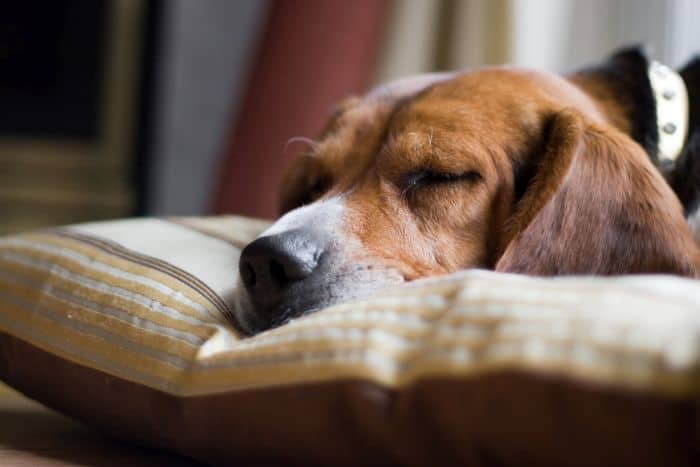
Do You Need to Take Your Dog to the Vet for a Stuffy Nose?
In many cases, simple things like a runny nose or a stuffy nose are not troubling enough to warrant a trip to the vet. This is especially true if the congestion resolves on its own within 24 hours or so and your dog appears healthy in most other ways (meaning that he’s not displaying any other respiratory symptoms).
However, if the congestion lasts for more than a couple of days, only seems to affect one nostril, or if it is accompanied by a fever or green nasal discharge, you should take your dog in for an examination.
Additionally, if you note any neurological problems – holding the head in unusual positions, loss of balance, uncoordinated movements – you’ll want to take your dog in promptly.
Don’t have easy access to a vet? You may want to consider getting help from JustAnswer — a service that provides instant virtual-chat access to a certified vet online.
You can discuss the issue with them, and even share video or photos if need be. The online vet can help you determine what your next steps should be.
While talking with your own vet — who understands the ins and outs of your dog’s history — is probably ideal, JustAnswer is a good backup option.
Can You Give a Dog a Decongestant?
Congestion often occurs because the blood vessels in the nose swell, reducing the amount of air that can flow through the nose and, consequently, making it difficult to breathe. So, people suffering from stuffy noses often take decongestants to feel better.
Decongestants help reduce the size of the blood vessels, which allows more air to flow through the nasal passages and allows the mucus to drain away.
Dogs can benefit from decongestants in the same manner. However, you should never give your dog a decongestant — or start any other treatment option — without first consulting your vet. Some decongestants are actually combination medications which contain other, potentially harmful, drugs.
Additionally, decongestants are not suitable for dogs suffering from some health conditions.
You’ll also need to know the proper dosage to provide your dog. Only your vet can determine the correct dosage for your pooch, which further highlights the importance of veterinary assistance when dealing with a congested pet.
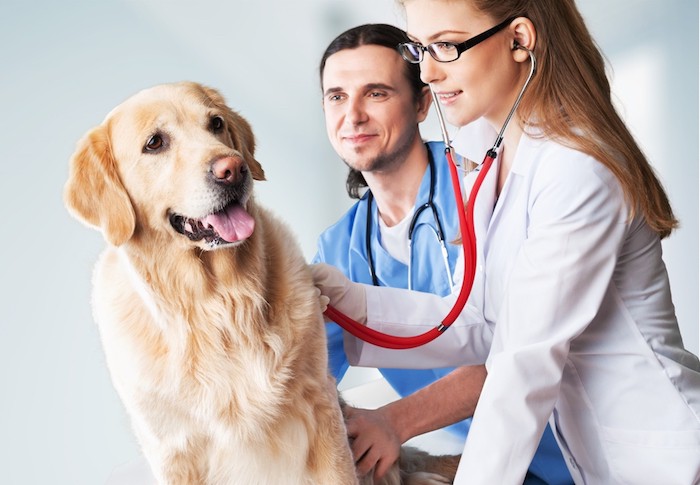
For that matter, you’ll also need an accurate weight, which your vet is better prepared to determine than you are.
If your dog is healthy and not on any medications, you may be able to consult a vet online through the Just Answer service, which can put you in touch with a vet over a live chat. You can even share videos or images and get an instant diagnosis from them.
How Do You Unclog a Dog’s Nose? Home Remedies for Your Dog’s Stuffy Nose
If your dog is only experiencing a temporary and mild case of nasal congestion, you may be able to treat the problem at home. Just be sure that you contact your vet if his symptoms worsen or the congestion doesn’t go away in a day or two.
A few of the best home remedies and care strategies for congested canines include:
Gently massage your pup’s nose to loosen the mucus and allow it to drain. This likely feels good to your dog in the same way it often feels good to massage the bridge of your own nose when you’re congested.
Use a nasal aspirator (like this one) to suck out the excess mucus. Be very gentle while doing so, and be sure that you only insert the tip of the aspirator into your pet’s nasal passages. Be sure to clean the aspirator thoroughly after use, and, although I really hope this needn’t be said, don’t use the same aspirator on your dog that you use for your child.
Have your dog lay on the bathroom floor while you take a hot shower. The steam will help moisturize his nasal passages and potentially allow the mucus to drain away. Be sure to leave the exhaust fan off so you don’t end up just pumping the humid air outside.
Use a humidifier to raise the amount of moisture in the air inside your home. If you confine your dog to a small room with the humidifier, it’ll likely produce better results. Be especially careful to clean your humidifier regularly in the manner outlined by the manufacturer – dirty air humidifiers can cause additional health problems.
Are There Any Over-the-Counter Medications You Can Give Your Dog for a Stuffy Nose?
A few common human medications may be helpful for treating your dog’s nasal congestion. For example, some vets recommend oxymetazoline (Afrin) for dogs suffering from congestion.
However, other common medications humans use can be toxic to pets.

Accordingly, you should never give your dog an over-the-counter medication for nasal congestion without first consulting your vet. Then, if your vet gives you the green light, administer the medication in exactly the dosage and manner prescribed by your vet.
Acute Vs. Chronic Nasal Congestion
A short-term bout of nasal congestion is typically not a big deal. Most pups should recover on their own in a day or two. But some dogs end up suffering from long-term, chronic nasal congestion, which can seriously reduce their quality of life.
In such cases, it is not only important to work with your vet to treat the symptoms related to congestion but to also take steps to identify the cause of the problem. This isn’t always possible, but it is something that you should always try to do.
Start by journaling your dog’s symptoms. Write down the time and date that the congestion started, and also record when he starts being able to breathe easily again. Note any treatments you or your vet employed and document their apparent efficacy.
It may turn out that your pet is allergic to something in your home (such as smoke, dust, or even your cat), or that your pet has an environmental allergy to grass, tree pollen or polluted air. Your pet may also be suffering from a seasonal allergy, if you notice the problem occurring more commonly during a specific portion of the calendar.
In other cases, it may turn out that your dog simply has a predisposition to nasal congestion.
Nasal congestion usually isn’t a big deal for dogs, particularly if it only lasts a short time. But your dog will probably feel pretty rotten while he’s stuffed up, so be sure to try some of the remedies described above.
Consult your vet if the stuffy nose is accompanied by other symptoms or lasts longer than a few days.
Has your dog ever suffered from nasal congestion? How did you treat it? Did you need your vet’s help or did the congestion resolve on its own? What do you think caused the problem? Was it something common, like a seasonal allergy or was it a rarer issue, such as nasal polyps?
Let us know your experiences in the comments below!
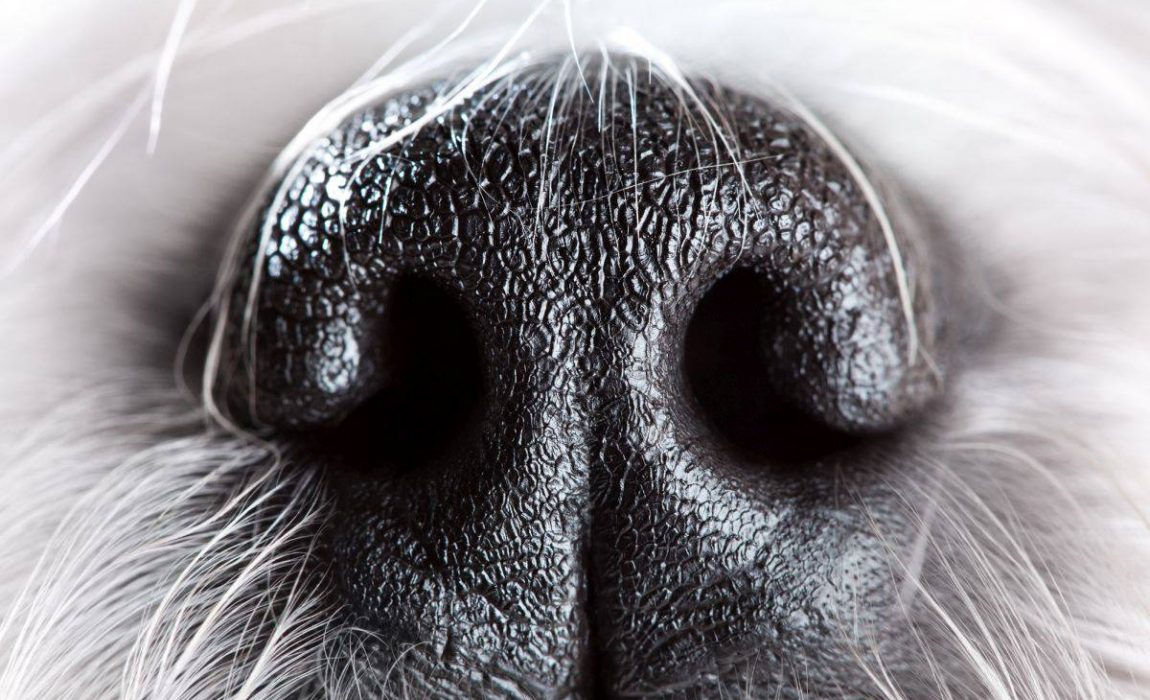

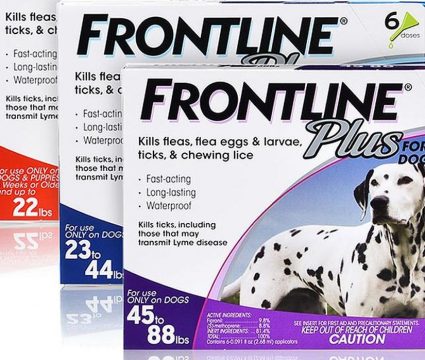




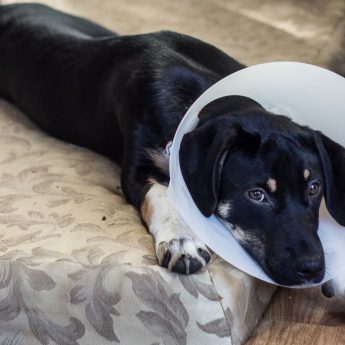

46 Comments
November 17, 2021
This is a helpful article. My dog (cattle dog / rotty mix) has had a long term sort of congestion issue. Like her sinuses are clogged but her nose doesn’t run or anything. I started massaging her snout on a regular basis and she wouldMELT when I did so and doing that regularly seems to keep her snorting and blocked nasal breathing away. Not sure how rubbing her solid snout gets stuff moving it seems to. We’re heading to the vet soon!
November 17, 2021
So glad you found the article helpful and got your pooch some relief, Kris! Best of luck at the vet.
August 6, 2021
48 hours of reverse sneezing and snoring sounds, it only occurred to me that my 7 year old ShihTsu is very congested in her nose. I thought it was her throat. Waiting to get her into the vet and have had her out in the cool air at night as the days are extremely hot. Many forest fires in the area which could be the culprit but I’m hoping to get some answers soon. Glad to have found this site.
August 6, 2021
Glad to have been helpful, Jordan!
Best of luck at the vet.
August 4, 2021
Oh I would always be interested in learning more ideas from other pet owners
July 25, 2021
Tilt your dogs head back and open mouth and drop pill only- aim for back or mouth
be quick
May 25, 2021
Try Benadryl tabs,coat with smooth peanut butter,mix i n his food,or put in a cooked meatball.usually 1 mg per pound ask vet. Make sure its Benadryl Allergy without additives.good luck.I use 25 mg tabs and pill splitter.Again ask vet if ok.
May 25, 2021
Assuming your vet is OK with it, that may work. But Benadryl does cause dogs to be quite sleepy, so it isn’t ideal for all scenarios.
May 26, 2021
I coat the Benadryl tablet with peanut butter, open my Rotty’s mouth wide and place on the back of her tongue. She eats the rest of the peanut butter off my finger. She too has a runny nose and vet recommended
Benadryl along with a 3 week course of steroid tablets. This combination did help.
April 30, 2021
Did take the dog to the Vet and they said it was just seasonal allergies and to give him benadryl; we have tried numerous ways to give him the benadryl, but he smells it and won’t eat – also tried grabbing him and using a syringe to put down his mouth (but truly hard). He has been congested for several days now and truly worried. The humidifier is on all night and during the day, but it doesn’t seem to be working. So need other guidance, do I take him to the Vet again? How about if they continue to say “it is just seasonal allergies and stick to benadryl”? What is the solution, he just sounds horrible and not sure if he is miserable. I have avoid take him out during the day and he is only walked at night.
April 30, 2021
Hey, Alicia. Sorry to hear about your pupper’s allergies!
If I’m understanding correctly, your vet already gave you a good solution. It sounds like you just need to learn some tricks & tips for getting your dog to take medicine.
🙂
Check out those tips and see if they help!
April 4, 2021
Sam, an eight year old Chihuahua has always had mild allergies until we moved into our current home, not quite two years ago. He has begun backwards sneezing, constant nasal drainage, what appears to be postnasal drip, coughing. December 2020, vet put him on antibiotics and prednisone as his lungs were inflamed. He did really well for about a month and a half. All of the symptoms have returned, The mucus from his nose is now turning green. I will be returning to the vet with him ASAP. Contacted specialty vet, $190 just to walk in the door. Being disabled and on a very minimal income, it is a parent, That I can no longer afford to have and care for properly, dogs or cats. I truly just want my Sammie to feel better and be able to play ball, which he loves, like we always have.
April 5, 2021
Hey, Kate.
Sorry to hear about the problems with your little guy.
We’ve got our fingers crossed for you both!
February 2, 2021
My poor baby girl has been suffering with nasal congestion for quiet awhile. The vet has taken x-rays of her snout twice and also a culture. Nothing was found in the x-rays and nothing in the culture. He suggested mucinex but so far nothing it has not helped. I also have tried children’s benedral. I hate given her that kind of meds. I am at my wits end and want so bad to help her. I will try your suggestions and see if that will help. A Very Frustrated Dog Mom!!!!
February 2, 2021
Best of luck, Candice!
Also, don’t be afraid to seek a second opinion from another vet — sometimes one vet will notice something a previous vet has missed.
Our fingers are crossed for you and your pooch!
December 16, 2020
My dog has allergies and she is 10 lbs, she gets 1/2 Claritin D tablet, she gets so congested she can hardly breath.
January 25, 2021
Claritin is safe to use in dogs and cats, but Claritin-D (“D” for decongestant) is potentially deadly (I always remember this as “D” for “deadly” for pets!). When ingested by dogs, signs of a racing heart rate, abnormal heart rhythms, high blood pressure, tremors, seizures, and death can be seen.
September 13, 2020
My pomchi has always done the reverse sneezing but recently she started to sounds congested… other then that she is still eating…peeing..pooping! No mucus coming outta eyes or nose! Gums are still pink!! Any idea what I can try to help relieve congestion? She is 10 pounds or less but kinda scared to try Benadryl as I don’t wanna make her sleepy!
September 14, 2020
Hey, Janet.
Glad your pooch sounds like she’s in good health otherwise, but we’re sorry she’s all stuffed up!
Just give your vet a call and see what he or she recommends.
Best of luck!
June 11, 2021
hi fyi benedryl is very safe and wont make them sleepy
call your vet for correct dose benedryl allergy works
August 23, 2020
Our 10 year old mixed breed dog (terrier, hound & ?) has been having nose issues for 10 months or so. She reversed sneezes, you can hear how stuffed her nose sounds all she’s resting. When she sneezes she often sneezes out thickish sometimes yellowish looking mucus. Although she is mostly as energetic as normal and definitely eats is normal it is worrying. We have taken her to the vet at least four times and spent over $1000. They don’t think she has nose tumors. They gave her antibiotics twice, they gave her medicine for nose mites and have run numerous blood tests and nose cultures. This all started last fall when our regular vet told us that we could stop giving her Zyrtec that we have been giving her or her entire life because she has allergies. Since then it’s just been so much worse. He was never anywhere near this bad before she stopped taking the allergy medicine for about a month or even less. But nothing we do for her now seems to help. Any ideas? Thanks.
August 24, 2020
Hey, Terri.
We’re sorry you and your pooch are having such a tough time! There’s not much advice we can provide from afar, and it sounds like your vets are working to figure out a good strategy.
We would mention that it never hurts to get a second (or third, or fourth) opinion if your current vet doesn’t seem to be able to figure out what’s going on.
Keep us updated — our fingers are crossed for your four-footer!
July 3, 2020
Our 14 year old AmStaff has a nearly stopped up nose. Yesterday the vet prescribed Cefpodoxime saying that he appeared to have a bacterial infection. He was also given steroid drops for his left eye. I’ve used a bulb syringe when his nose was runny but now the mucus is hardening up inside of his nostrils. A q-tip doesn’t work in this situation. What can I do to clean out his nose?
July 6, 2020
Hey, Diana.
I don’t know that there is a great solution in this situation. Give your vet a call to be sure, but you’ll probably just have to let his body break down everything naturally.
However, some time spent in a steamy bathroom or near a humidifier may help.
Best of luck!
June 21, 2020
Hi Ben
Thanks for the informative article and advice above.
We have a 3 yr old Pomeranian who is pretty “shnorky” all the time. Been told it’s the breed, and he is active and full of beans all the time, but I nonetheless do worry about it. Every now and the he does the reverse sneeze thing and it looks as if he is struggling to get the air into him, which is quite scary. But after a minute or two, he just carries on as if nothing happened. He also snores loudly enough to wake me ! lol
Is this all just normal for the breed ?
I am considering trying the hot shower advice and see if it helps at all.
Any other advice ? ( Vet thinks all is good…. )
Thank you.
June 22, 2020
Hey, Liza.
If your vet thinks your pooch is healthy, then you probably don’t have to worry. Reverse sneezes can certainly be frightening, but they’re usually no cause for concern.
The shower trick may be helpful, but otherwise, you’re likely just seeing a characteristic of the breed.
Best of luck!
May 30, 2020
I have a 5 year old australian cattle dog/pit bull mix. He snores all the time, but it really is starting to sound more congested (no drainage) and the snoring has periods of apnea like breathing. I live in western NY. No cats in home, vacuum regularly, no smoking. I like my vet, but guarantee he’ll put my dog on a course of antibiotics which really bothers his stomach. Any other ideas?
June 1, 2020
Hey, Penny.
Have you discussed the stomach issues with your vet? There are a number of ways he or she may be able to alleviate any stomach upset that comes along with antibiotics.
Nevertheless, while antibiotics are sometimes necessary for treating bacterial infections or other problems, you may need to find a new vet if you think he or she is prescribing them inappropriately or for no reason.
Best of luck!
May 23, 2020
My dog’s congestion is caused by lymphoma nasal tumor which developed very quickly and was initially thought to be allergies. He feels miserable and I have tried steam showers and cold mist humidifier with no success. Can an antihistamine really help him?
May 25, 2020
Ugh, that’s terrible, Linda! Your poor pooch!
That’s really a question for your vet. I kind of doubt that an antihistamine would be helpful in your situation, but maybe your vet could recommend an alternative.
Best of luck!
March 1, 2020
How can I unstuff my dashound dogs nose to help him breath
March 2, 2020
Hey, Deborah. There are four different home remedies listed above. The nasal aspirator is likely the most effective (if also the grossest).
Best of luck!
December 12, 2020
Thank you this article. My 10 year old dachshund has had nasal problems since birth. I’ve had him since he was 1 month old, he was the runt of his litter. Luckily he blossomed in my family but he was always seeing vets due to his congestion and nasal discharge. Usually he was given antibiotics which helped only temporarily. It wasn’t until he got really sick one time that I went to another vet, she immediately said the congestion had caused pneumonia which they treated. A few weeks later we took him back to have an exam done and it turns out he has an autoimmune disease which causes an overproduction of cells in his nasal passages. Ever since, we always steroids at home. When he’s really congested he gets them twice a week otherwise just once a month if necessary. To all other parents of snotty pups, I suggest finding other vets willing to look for the cause. Best of luck.
January 8, 2020
Boston terrier has had major congested reverse sneezing and coffing his whole life. He had kennel cough as a puppy and has had some respiratory infections. He still eats and is playful but as he approaches 10 years old not as much. I only take him in to the vet when he doesn’t eat. I think he has a weak respiratory system coupled with some allergies but in not sure. I give him lung gold and immine vitamins. They really dont help that much.
December 28, 2019
I was wondering if a dog can take Keeflex it’s an antibiotic used for sever infections & her congestion is pretty bad??
December 30, 2019
Hey, Stephanie. You should never give your dog a medication without first checking with your vet.
However, they’ll likely just recommend you bring your dog in for an examination.
Best of luck!
November 12, 2019
My dog has trouble breathing here and there. She is still playful and no loss of appetite. Just today, I wiped her nose because there light yellow mucus. I read that you can give them Mucinex. Is this ok or try the humidifier?
November 12, 2019
Hey Anita – yellow nasal discharge tends to be a sign of an infection. That, and with the breathing issues, means you should visit your vet!
December 13, 2019
My bulldog has been stuffy for a few days. We have been doing the shower thing but was also wondering if I could do the Afrin? He seems fine other than his nose going from stuffy to runny(clear).
December 13, 2019
Hey, Tena. It’s always important to consult with your vet before giving your pooch any over-the-counter medication.
Best of luck!
November 3, 2019
Our rat terrier started sounding congested when breathing. We were having very dry air which is not a norm for south Louisiana. We ran hot water in the shower to steam up the bathroom & took her in there so she could breathe the humid air. It seemed to stop her congestion so we set up a warm mist humidifier last night for her & it seemed to work. Hope this info helps someone’s pet.
October 20, 2019
My PWD has a tumor on his septum. Vet said it has broken the cribiform plate and is growing in his spetum.
He has sneezed blood clots which has been stopped with Yunnan Bayaio. TCM supplement.
I am giving him 1 Zyrtec 2x daily, piriforum(sp) anti Inflammatory and Boiron ColdCalm for more congestion relief.
I’m considering Turmeric for more anti inflammatory.
Any ideas?
He had a rhioplastic procedure on the left side. I asked if he could have one on the other side and the vet said no.
Thank you
Patti Weiss
October 21, 2019
Hey, Patti.
So sorry to hear about your pooch’s troubles. We wish you the very best of luck, but given the complicated nature of your four-footers challenges, we’d defer to your vet 100%.
October 22, 2019
I don’t know where you live but take to nearest vet school for another opinion if possible. They may have more suggestions. This does not mean your vet is not correct, but I have found that through the years with animals that taking to vet school for more serious problems worked best.
September 30, 2019
My dog Bella sometimes (early morning) when she first wakes up. Will dig at the side of her nose. This only happens once or twice a day. I’ve begun to notice it sometimes happens once in a great while in the evening too. There’s no discharge, no lose of appetite, or lose of balance. Doesn’t seem depressed either. Should I still have her checked out by our vet, or am I just worried for nothing? Any advice would be very helpful for me
September 30, 2019
Hey, Brian.
This probably falls into the “it’s probably nothing, but you should go ahead and have your vet take a look anyway” category.
🙂
Look at it this way: Even if it isn’t a serious health problem, it sounds like she’s a bit irritated by it. Maybe your vet can prescribe a medication or recommend a treatment that’ll help her feel better.
Best of luck! Let us know how it goes!